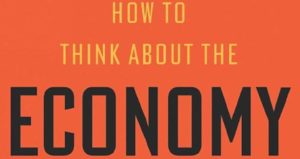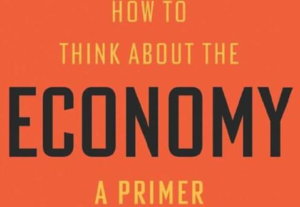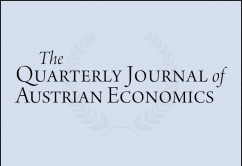Austrian economics is a scholarly tradition that consists of a body of theory that explains how an economy works. Austrian economists develop theory a priori, meaning explanations are derived logically from sound starting points (i.e., the “action axiom” to Mises). This means the theory is true and can therefore be used to uncover the actual causalities behind observable phenomena. Economics is, therefore, to “Austrians” a framework for understanding what we see.Other traditions in economics rely on data to formulate theory, which means their theory is a set of corroborated hypotheses. They thus make a much weaker claim because the data analyzed are always a selection (a sample, not an entire population), the measures and metrics are not the actual concepts but
Read More »Articles by Per Bylund
Wanted: Critics of Austrian Economics
November 13, 2024Present-day Austrian economics suffers from a significant and rather interesting problem: a lack of critics. What I mean by this is not that there are not enough trolls, hecklers, and politically-motivated anti-economists. No, I mean that there are very few, if any, real and knowledgeable critics of Austrian economic theory.The Austrian tradition has had an important and lasting impact on economics over the past century and a half. Much of this was due to fierce scholarly debates either started by Austrians or in which they played a prominent role. Consider Carl Menger’s debate with the German Historical School on method and theory in what came to be known as the Methodenstreit. Or Böhm-Bawerk’s takedown of Marx’s exploitation theory. Or the decades-long debate on
Read More »Is Stephanie Kelton Failing Her Academic Responsibility?
July 2, 2024What is the Mises Institute?
The Mises Institute is a non-profit organization that exists to promote teaching and research in the Austrian School of economics, individual freedom, honest history, and international peace, in the tradition of Ludwig von Mises and Murray N. Rothbard. Non-political, non-partisan, and non-PC, we advocate a radical shift in the intellectual climate, away from statism and toward a private property order. We believe that our foundational ideas are of permanent value, and oppose all efforts at compromise, sellout, and amalgamation of these ideas with fashionable political, cultural, and social doctrines inimical to their spirit.
[embedded content]
Read More »Economic Education Has Become Economic Disinformation
May 7, 2024What is the Mises Institute?
The Mises Institute is a non-profit organization that exists to promote teaching and research in the Austrian School of economics, individual freedom, honest history, and international peace, in the tradition of Ludwig von Mises and Murray N. Rothbard. Non-political, non-partisan, and non-PC, we advocate a radical shift in the intellectual climate, away from statism and toward a private property order. We believe that our foundational ideas are of permanent value, and oppose all efforts at compromise, sellout, and amalgamation of these ideas with fashionable political, cultural, and social doctrines inimical to their spirit.
[embedded content]
Read More »Economic Education Has Become Economic Disinformation
April 27, 2024Modern economics is in terrible shape. But economics education appears to be worse still. This becomes clear when discussing basic economics with those who have taken courses in the field. Rather than doing away with economic misunderstandings and outright nonsense, economics education apparently provides students with a pseudoscientific rationale for their illusions.Two such ideas are annoyingly common. One is the view that markets can only work under perfect conditions. The other is that economic growth requires that profits tend toward zero. Yes, they are ridiculous, but they are so commonly held (and believed so strongly) that they suggest a fundamental failure of economics education. Whether or not they are explicitly taught, it is easy to see how an
Read More »Separating Information from Disinformation: Threats from the AI Revolution
March 11, 2024Artificial intelligence (AI) cannot distinguish fact from fiction. It also isn’t creative or can create novel content but repeats, repackages, and reformulates what has already been said (but perhaps in new ways).I am sure someone will disagree with the latter, perhaps pointing to the fact that AI can clearly generate, for example, new songs and lyrics. I agree with this, but it misses the point. AI produces a “new” song lyric only by drawing from the data of previous song lyrics and then uses that information (the inductively uncovered patterns in it) to generate what to us appears to be a new song (and may very well be one). However, there is no artistry in it, no creativity. It’s only a structural rehashing of what exists.Of course, we can debate to what extent
Read More »The Economics of the AI Revolution
March 9, 2024In a recent article, we briefly summarized what it is that we today call artificial intelligence (AI). Whereas these technologies are certainly impressive and may even pass the Turing test, they are not beings and have no consciousness. Thus, this is neither the time nor the place to discuss philosophical issues of how to define a true or full AI—an artificial general intelligence—and whether we should recognize AI software legally as a person (after all, corporations are).Economically speaking, AI as technology, whether it is used for entertainment or in production, is a good. As Carl Menger taught, what makes something a good is that it (whatever it may be) has the ability to satisfy a human need, that it must be recognized as such, and that a person—the
Read More »Understanding the AI Revolution
March 8, 2024The artificial intelligence (AI) revolution is here, and it is bound to change the world as we know it—or so proclaims the hype following the release of OpenAI’s ChatGPT version 3.5 in November 2022, which was only the beginning. Indeed, much has happened since then with the release of the much-improved version 4.0, which was integrated into Microsoft’s Bing search engine, and the recent beta release of Google’s Gemini.Lots has since been written about what AI could mean for humanity and society, from the positive extremes of soon-here Star Trek technologies and the “zero marginal cost” society to the supposedly imminent “AI takeover” that will cause mass unemployment or the enslavement (if not extermination) of mankind. However, how much of this is fiction, and
Read More »Introduction to the Chinese Edition of How to Think about the Economy: A Primer
January 15, 2024To the Chinese reader:
It is safe to say that economics suffers at least as many fallacies and misunderstandings as any other field of study. Had physics suffered the same level of issues, we would not have seen much—if any—of the progress that we have made over the past centuries. Yet, economics—the queen of the social sciences—keeps being misrepresented, if not abused, and we suffer the consequences.
Those consequences are primarily in the form of the “unseen,” or what we would otherwise have gotten, and the “unrealized,” or the possibilities and opportunities that we would have benefited from were it not for our misunderstandings of how the economy works and, therefore, our hubristic attempts to design the economy and determine its outcomes.
However, the
How Government Meddling Makes Us Poorer
November 23, 2023The Austrian (TA): At mises.org, we’ve focused a lot on how monetary policy can increase inequality and impoverishment. But the same could be said of many other non-central-bank interventions in the economy. What are some of these interventions that are making us worse off?
Per Bylund (PB): I think what is important to remember is that any change in the economy implies a shift in the production structure and thus in how resources are used. This includes innovations and entrepreneurship ventures, which outbid other producers and therefore replace other production. While we can use more or less natural resources, we don’t actually add much to the economy—we figure out new ways of doing things and new things to do. This is why it is so important that such changes are
The Objective Science of Subjective Value
November 1, 2023While most economists admit that value is subjective, they still err by concentrating on scarcity and choice instead of purposeful action by individuals.
Original Article: The Objective Science of Subjective Value
[embedded content]
Tags: Featured,newsletter
Read More »The Government vs. the People, Kamala Harris Version
July 17, 2023It is no surprise to libertarians that what is in the interest of the government might not be in the interest of people in general. More often than not, the government’s interest is directly at odds with the interests of people in general. The countless wars waged by governments throughout history, for which common people paid ultimately with their lies, bear witness to this fact.
Wars are also waged on the domestic populations that the government supposedly serves and protects. Under the guise of the greater or public good, which always require some sacrifice yet curiously dovetail with the government’s interests, individuals are the means if not the problem. In the words of Pierre-Joseph Proudhon, they’re “watched over, inspected, spied on, directed, legislated
The Market Process Is Not a Knowledge Problem
June 19, 2023While F.A. Hayek’s famous 1945 essay effectively critiques the "perfect information" hypothesis, it is an inadequate explanation of the issue of economic calculation.
Original Article: "The Market Process Is Not a Knowledge Problem"
[embedded content]
Tags: Featured,newsletter
Read More »Are Libertarians Abandoning Free Trade?
May 9, 2023A bedrock of Austrian economics and libertarianism has been free trade. Unfortunately, some people who claim to value liberty no longer value unhampered exchange.
Original Article: "Are Libertarians Abandoning Free Trade?"
[embedded content]
Tags: Featured,newsletter
Read More »How to Think about the Economy: A Primer Audiobook
April 10, 2023How to Think about the Economy was written to accomplish something big: economic literacy. It is intentionally kept very short to be inviting rather than intimidating. You will gain a life-changing understanding of how the economy works in practically no time.
Narrated by John Quattrucci.
Download the complete audiobook (12 MP3 files) in one ZIP file here. This audiobook is also available on Soundcloud and via RSS.
Purchase the Audiobook on Audible/Amazon, or paperback at the Mises Store.
[embedded content]
Tags: Featured,newsletter
Read More »How to Think about the Economy
February 27, 2023Recorded in Tampa, Florida on February 25, 2023.
[embedded content]
Tags: Featured,newsletter
Read More »The Economy Is a Process Not a Factory
October 10, 2022[Chapter 4 of Per Bylund’s new book How to Think about the Economy: A Primer.]
To help us understand what is going on in the economy, what is important is not the types and number of goods that sit on store shelves. It is why and how they got there.
To answer this question is not simply a matter of pointing out that they arrived by truck last week, because that only tells us about how they were transported to the store. This doesn’t tell us anything about all the steps that had to happen to make them available. And there is a lot that takes place before a good is available to buy in a store. Every good you see on a store shelf was originally thought of by someone; it was designed and then produced. The production process was developed, all its operations and the
How to Do Economics
October 9, 2022[Chapter 3 of Per Bylund’s new book How to Think about the Economy: A Primer.]
Economics is often faulted for being “ideological”—for promoting free markets. This is a misunderstanding.
The free market in economics is a model—an analytical tool. It excludes complicating circumstances and influences and allows us to study core economic phenomena on their own so that they are not mistaken for other effects. In economics, we are interested in understanding the nature and relationships of economic forces. In other words, we exclude things that hamper the economy, such as regulations, that impose upon people’s behavior and therefore economic outcomes. The result is an economy where only economic forces are at play—a “free market.”
The free-market model serves the same
How to Think about Economic Theory
September 27, 2022[Chapter 2 of Per Bylund’s new book How to Think about the Economy: A Primer.]
Like other sciences and fields of study, economics is a body of theory. Theory is a collection of explanations that allows us to understand something. Economic theory allows us to understand how an economy works. It explains the workings of the economy as a whole so that we can understand the meaning, impact, origins, and evolution of economic phenomena.
For theory to be reliable and useful, it must provide a coherent picture. If it doesn’t, then some of its explanations are contradictory. Contradictions are a sign that something is wrong. So, the body of a theory must be logically stringent and must make up a consistent whole. This means it must be consistent with the basic
What Economics Is
September 23, 2022[This article is chapter 1 from Bylund’s new book How to Think about the Economy: A Primer.]
Economics is an exciting field. The economics of old sought to uncover how the world works. It showed, or even proved, that there is a natural order to it. There is structure to the apparent chaos. The economy has something of a life of its own: it has a nature. This means not only that we can study it and learn about its ways, but also that we are not free to tamper with it at will and cannot make it work in ways that we might prefer but that are not in line with its nature. There are “laws” by which the economy works, and they are immutable. Economics over the past three centuries has been about identifying, learning, and understanding those laws.
Core to understanding
The Political Alchemy Called Modern Monetary Theory
September 16, 2021The new kid on the economics block is something called modern monetary theory. The name is new, but the “theory” is not.
Proponents adamantly claim that it is both new and a theory of economics. To make it appear this way, they dress the ideas in unusual-sounding jargon and use rhetorical tricks. For example, instead of presenting actual arguments or responding to direct questions, they present a circular flow of deepities. To top it off, they, at least in my humble experience, usually lack fundamental economic literacy. This can make rebutting their nonsensical claims a challenge and, as a result, debates with this crowd typically go nowhere.
In order to figure out what exactly they are claiming—beyond the deepities—I decided to acquaint myself with the prominent
The Political Alchemy Called Modern Monetary Theory
September 16, 2021The new kid on the economics block is something called modern monetary theory. The name is new, but the “theory” is not.
Proponents adamantly claim that it is both new and a theory of economics. To make it appear this way, they dress the ideas in unusual-sounding jargon and use rhetorical tricks. For example, instead of presenting actual arguments or responding to direct questions, they present a circular flow of deepities. To top it off, they, at least in my humble experience, usually lack fundamental economic literacy. This can make rebutting their nonsensical claims a challenge and, as a result, debates with this crowd typically go nowhere.
In order to figure out what exactly they are claiming—beyond the deepities—I decided to acquaint myself with the prominent
Introduction to the Entrepreneurship Special Issue
December 8, 2020The Austrian school of economics has been all but left by the wayside in economics (e.g., Backhouse 2000). This fate, shared with all “heterodox” approaches that do not fully comply with mainstream dogma, means Austrian theory is at best discounted by other economists. More often, and typically, it is forgotten and a relic of the past.
At the same time, Austrian economics is the only school of economic thought that is well represented in the study of entrepreneurship (e.g., Dahlqvist and Wiklund 2012; Korsgaard, et al. 2016; Packard and Bylund 2018).1 Austrian theories, concepts, and perspectives on entrepreneurship make up an important part of what is modern entrepreneurship theory (Klein and Bylund 2014).
Although the former is as unfortunate as the latter is
Entrepreneurship in the Time of COVID-19
June 7, 2020Per Bylund, author of The Seen, the Unseen, and the Unrealized: How Regulations Affect Our Everyday Lives has commented extensively here at mises.org, and in a variety of entrepreneurship-focused publications, about the economics of entrepreneursip. Editor Ryan McMaken recently asked Professor Bylund to comment on what challenges entrepreneurs face right now in a rapidly changing legal and economic landscape.
Ryan McMaken: It seems entrepreneurs are in an especially tight spot right now. It is especially difficult to predict if one’s business will even be allowed to be open six months from now. What sort of problem does this much regime uncertainty create for entrepreneurs?
Per Bylund: There are many problems with this, but most fundamental is that it undermines
Why an Economy Can’t Work without Market Prices
May 23, 2020It has been a full century since Mises dropped the economic calculation bomb, but the argument apparently still haunts socialists. It should, since Mises managed to show that a socialist economy is not an economy at all but calculational chaos. Yet it is curious that it does, since most have (incorrectly) concluded that Mises’s argument, after decades of debate, was debunked.
Why does a presumably debunked argument still, drive even non-Austrian critics to pen new responses and deliberate on apparent flaws?
Part of the answer might be that the debate ended without a proper conclusion. Mises’s critics, specifically the “market socialists” of the 1930s, misconstrued his argument as being about the existence, rather than meaning, of prices. Their answer, as simple
How Modern Economics Has Lost Its Way: It’s All About the “Unseen”
May 21, 2020Economics has lost its way and the study has become both impotent and lacking in relevance. It’s easy to see how and why once we recognize that proper economic thinking takes place two steps beyond the apparent. Noneconomists typically take none of these steps, while modern economics has lost the ability to go beyond the first.
This can, I think, be explained by economics’s increasing adoption of and reliance on mathematical and equilibrium models, which typically disallow the second step.
What are the steps?
They involve going beyond what is directly observed to uncover first the immediate or atemporal tradeoff and then the temporal dimension of the tradeoff in an overall process.
Frederic Bastiat famously distinguished good and bad economists by their ability
When It Comes to Raw Power, Few Have More of It Than Central Bankers
February 24, 2020A common retort to the claim that in voluntary exchange both parties expect to become better off (or they wouldn’t do it) is that exchanges are seldom, if ever, a matter of horizontal, equal exchange of values. Instead, any such interaction between people is ultimately a matter of their exercising power over one another. The implication, and often explicitly stated conclusion, is that there is no voluntariness, that exploitation is always present, that one party necessarily gains at the other’s expense.
This rather dismal view of man makes clear that people apparently are slaves to power, their own hunger for it as well as others’ wielding of it. We are forever at each other’s throats in some kind of hyper-Hobbesian fashion:
Although power is always involved,
Is Free Market Economics Too “Ideological”?
February 21, 2020Free market economics is often ignorantly dismissed for being “ideological” rather than scientific. It probably sounds smart to the economically illiterate, but it is decidedly not. It doesn’t mean nearly what most people assume it does. The word “free” in free market economics is not used as a normative value judgment but indicates an economy that is unaffected by exogenous (from the outside) factors.
“Free” therefore means that it is the market economy in and by itself that is subject to theoretical analysis. This is, in fact, the only way to identify any and all “pure” market mechanisms and processes.
If economics tried to inductively extract theory from data, we could never know what it is we capture in those data: is it the actual (underlying) economic
The Economy Is Not a Factory—Nor Should We Try to Make It One
February 11, 2020A common issue with economists and political economists from left to right is that they misunderstand the market economy as simply being a set of production processes. We see this in Lenin’s statement that the Soviet Union should be run like one big factory. We see it in market socialists from Frederic Taylor to Oskar Lange attempting to respond to (and resolve) Mises’s argument that socialist economic calculation is impossible. And we see the same thing in the efficiency (and market failure) nonsense of Chicago school economists. The misconception is the same: that a working (and progressing) economy is about the management of existing production.
To be fair, if the economy is truly a matter of simply maintaining production processes, then it is certainly
Intellectual Property: Innovation Should Serve Consumers, Not Producers
February 6, 2020Proponents of intellectual property rights often rely on one of two lines of reasoning. The first is based on the misunderstanding that the frequency or volume of innovations determine economic growth. The second is captured by the question, “So if I spend $1 billion on R&D (research and development) to bring a new drug to market, anyone should be able to copy my drug without compensation?” Both are based on the same fundamental error: assuming that innovation is a matter of production. It is not. Innovation is all about entrepreneurship, and that’s why intellectual property rights do not and cannot help.
The economic growth argument appears to be in line with empirical observation. After all, it is the introduction of and change caused by valuable innovations














